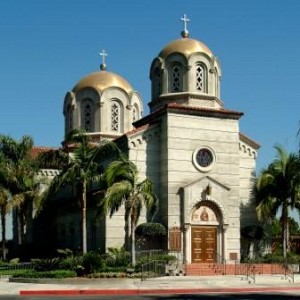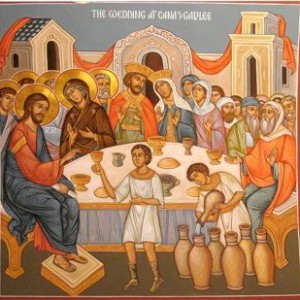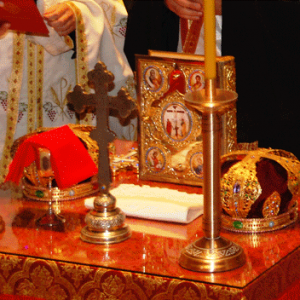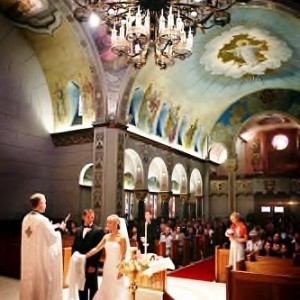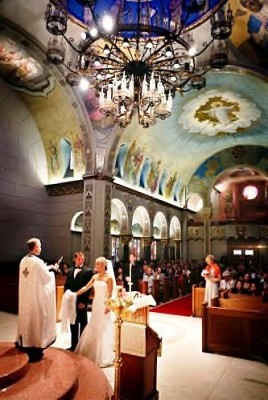The Sacrament of Holy Matrimony at Saint Steven's Cathedral
PREPARING FOR THE SACRAMENT OF MARRIAGE
We as a parish rejoice in the love that you, as a couple, share for one another and the commitment that has been made to bring you to this day in preparation for your marriage. Your decision to be married in the Church is an indication that the Christian faith and the sacramental life of the Church are important to you. In the eyes of the Church, marriage is the sacramental union between a man and a woman that is used in the Bible as the image of God’s faithful love for ancient Israel (Isaiah 54; Jeremiah 3; Ezekiel 16) and Christ’s sacrificial relationship to the Church (Ephesians 5:22-33). Jesus Himself, together with His mother the Theotokos and the disciples attended and blessed a wedding in Cana of Galilee, performing His first miracle, which assisted in the celebration of that event (John 2:1-11). When we say that Christian marriage is a sacrament, we use that word to convey the depths of the bond you are about to enter into: As Christians, the sacrament of marriage is your oath of loyalty unto death to each other and - as a couple - your oath of loyalty unto death to our Lord Jesus Christ. Christian marriage is intended to be a sign of God’s presence and love in this fallen and broken world.
COORDINATING YOUR WEDDING
Our office staff will assist you with the necessary forms. They will work with you in all matters pertaining to your wedding, including setting the date, scheduling meetings with our Cathedral Dean, Fr. Nicholas Ceko, preparing the necessary church documents and collecting all necessary fees. Please feel free to ask them any questions you may have regarding your marriage here at Saint Steven's Cathedral.
One of our wedding coordinators will be assigned to your wedding and will lead you through your wedding rehearsal and be with you on your wedding day. She will put you at ease as she coordinates your procession and assists you in any way possible. The fee for this service is $100.00.
SETTING THE DATE
A couple desiring to be married should first contact the church office to schedule an appointment with the Dean. According to the official policies of the Serbian Orthdoox Church, weddings may not be celebrated during the fasting seasons or the major feast days of our Church:
This is in keeping with our ancient way of celebrating the Christian mystery in worship and exceptions can be made only rarely, in extreme circumstances, with the permission of the bishop.
Because marriage is a sacrament, weddings cannot be celebrated in a spiritual vacuum. This, therefore, presupposes that:
1. at least one of the couple to be married is an Orthodox Christian, baptized and /or chrismated in the Church, committed to Christ and His Church and an active member of the parish for at least a year prior to the date of the wedding; and
2. the intended spouse, if not Orthodox, be a Christian baptized in the name of the Father, Son and Holy Spirit as commanded by the Lord ( Matthew 28:19).
Because of the sacramental nature of the marriage bond (in which a couple not only pledge their love for each other but also their love for Christ) a wedding between an Orthodox Christian and a non-Christian may not be celebrated in the Church.
NECESSARY PAPERS AND DOCUMENTS
The following documentation is needed to insure that your wedding will meet the criteria established by the Church and local civil authorities:
1. verification of the baptism and church membership of the Orthodox spouse;
2. verification of the baptism of the non-Orthodox spouse in a Christian community that baptizes in the name of the Father, Son and Holy Spirit (for example, the Roman Catholic and, traditionally, mainline Protestant churches such as the Lutheran and Episcopalian communities);
3. and a civil marriage license.
Also, please note that because a civil license carries a time limit your civil license should be secured less than three months prior to the desired date of the wedding.
IN CASE OF PRIOR MARRIAGES
If either of the parties has been previously married, the death certificate of the deceased spouse or the civil divorce decree issued by the state must be presented to the dean. If the prior marriage was celebrated in the Orthodox Church and ended in divorce, then an ecclesiastical divorce decree must also be presented.
THE WEDDING PARTY
The First Witness who will participate sacramentally in the service by exchanging the rings that form an integral part of the marriage rite - must be an Orthodox Christian. The Second Witness, if not an Orthodox Christian, may, upon approval of the bishop, be a Christian from another Confession, however, must have been baptized in the name of the Father, Son and Holy Spirit as commanded by the Lord (Matthew 28:19).
THE BRIDAL DRESS AND ATTENDANTS’ GOWNS
Care should be taken in selecting the bride’s dress. Since the wedding crowns are an integral part of the wedding ceremony, headpieces must not interfere with the proper placing of the crowns on the brides’ head. The bridal gown and attendant’s dresses should also exercise a decorum befitting a Church ceremony. Sholdiers are to be covered, either as part of the dress or with shawls.
NECESSARY ITEMS FOR THE CELEBRATION OF THE SERVICE
Among the items necessary to celebrate one’s marriage in the Church are the following:
1. A pair of rings
2. A pair of candles.
3. A scarf to tie the hands of the bride and groom together.
Some couples also choose to provide a silver or gold chalice or "common cup," used at the ceremony. These latter items are optional for the couple as the parish can provide them if necessary.
MUSIC
The Cathedral Choir may be hired to sing for Weddings. A separate form and fee is necessary to secure thier services.
A vocalist other than the chanter may sing prior to the beginning of the service, during or just before the processional. We maintain a list of vocalists who have sung for Orthodox Christian weddings here at St. Steven's Cathedral and if you like, we will give you those recommendations. As with all music sung at the wedding service, it must clearly reflect our Christian heritage and must be drawn from the Scriptures or the hymns of the Church. Again, if there are any questions, please consult the pastor. Each vocalist establishes his or her own fee and you would pay him or her directly.
VISITING CLERGY
Guest clergy may participate in a wedding at at the Cathedral. Canonically, it is the responsibility of the priest where the wedding is taking place to extend an invitation to any and all visiting clergy. Orthodox Christian clergymen in communion with the Serbian Orthodox Church are welcome to participate in the celebration of sacraments with the blessings of our dean.
Non-Orthodox clergymen from other Christian communities may not take part in the celebration of the sacrament of marriage per se. Clergy from other Christian confessions may be acknowledged at the conclusion of the wedding service and invited forward to the solea where they may offer a brief congratulatory address to the couple.
PHOTOGRAPHY AND VIDEOTAPING
Photographs of your wedding are permitted but should not in any way impede or distract from the celebration of the sacrament. Photographers should not be conspicuous and should not use a flash during the services. The same principle applies if you plan to have your wedding videotaped.
PREPARATION FOR MARRIAGE
In your meetings with the priest, he will discuss the sacramental nature of the marriage bond, the Christian understanding of marriage as it is expressed in the Scriptures and the marriage service itself. In addition, preparation for marriage at the Cathedral includes 6 sessions to help support you in the process of preparing for your marriage. In cases where one of the spouses is not Orthodox, the couple should plan to attend one of the many educational classes held at the Cathedral in order to be firmly grounded in the Orthodox Christian understanding of life.
HALL USAGE AND WEDDING RECEPTIONS AT SAINT STEVEN'S SOCIAL HALL
All of the information here concerns your marriage in the Church, the Sacrament of Matrimony. If you also desire to use the Cathedral's social hall for your reception, you will need to make arrangments with the Cathedral's event manager and Catering Committee. Only members of Saint Steven's parish have hall usage privileges. For more information about hall usage, please contact the Cathedral office at 626.284.9100.
A NOTE TO THE BRIDE AND GROOM
To those spouses who are Orthodox: there is no substitute for Jesus Christ in maintaining the dignity and sanctity of the marriage bond. For the celebration of your marriage in the Church to be real, you must live out, in subsequent years, the Christian commitment that you will make on the day of your wedding. The Sacrament is not a one day event, it is a lifestyle wherein the husband and wife live together in the bond of love, united to Christ and to each other in every aspect of family life.
To those spouses who are not Orthodox: you are always welcome here at Saint Steven's Cathedral. Please note that your marriage in the Church does not automatically grant you membership in the Orthodox Church. If you desire to become an Orthodox Christian this must be your decision, made after much prayer and thought, in consultation with the dean, and never for the sake of convenience. To both of you: the Lord and this parish are here to help, support and sustain you in your marriage bond and the life of faith to which we are called as Christians. May the Lord grant you both many years together in peace and oneness of mind and heart!
Useful forms and Documents in planning a Wedding at Saint Stevens' Serbian Orthodox Cathedral:
An Explanation of the Sacrament of Holy Matrimony
From the beginning, God in His providence planned
the union of man and woman.
There is no relationship between human beings
as close as that of husband and wife
if they are united as they ought to be.
- St. John Chrysostom (349-407 AD)
In the eyes of the Church, marriage is the sacramental union between a man and a woman that is used in the Bible as the image of God’s faithful love for ancient Israel (Isaiah 54; Jeremiah 3; Ezekiel 16) and Christ’s sacrificial relationship to the Church (Ephesians 5).
Holy Matrimony is a Sacrament of the Orthodox Christian Church in which a man and a woman are united together "in faith, in oneness of mind, through and in love." The Sacrament of Marriage is the Church’s recognition of a union that God has already begun to work with two persons lives. In marriage, the union enters a new reality, that of God’s Kingdom. It becomes open to the possibility of what God had intended marriage to be from the beginning: an eternal life of joy in union with Him.
For this reason in the Orthodox service there are no vows exchanged. Marriage in Christ is beyond a legal contract. Nor is there the phrase, "till death do us part." If marriage is brought into the Kingdom of God, death as separation has no power over it. Christ destroyed death by His Cross and proclaimed Life by His Resurrection, therefore the union of man and woman is eternal; it does not end with death.
The celebration of the sacrament of marriage is made up of the Service of Betrothal and the Service of Crowning. The text of these two services summarizes in words, images and symbols the Orthodox Christian teaching regarding marriage.
The Betrothal
The first part the wedding service is the Betrothal. It is in this service that the Church first prays for the couple. Here the Church recognizes and blesses a union which has begun "in the world” yet awaits fulfillment in the world to come. It is here where the exchange of rings takes place. After being blessed by the priest, the rings are placed on the right hands of bride and groom. The exchange of rings gives expression to the fact that they will constantly be complementing each other. Each will be enriched by the union. The exchange of rings represents a pledge to share and exchange both their physical and spiritual goods, a pledge of eternal love and devotion.
With promises reconfirmed and after the words of the final prayer, "let Thine Angel go before them all the days of their life," the Betrothal ends. The priest now leads the bride and groom into the Nave of the church into the bonds of Holy Marriage, where the Crowning takes place. This point in the service most clearly reveals the "action" of the sacrament.
The bride and groom bring themselves, each other, their lives and all that fills their lives to the altar as an offering to God. As they enter into the midst of the Church their relationship enters into the new reality of God’s Kingdom.
The Candles & Joining of the Right Hands
The bride and groom are given candles which are held throughout the service. The candles represent their willingness to follow the light of Truth, Jesus Christ, and that they will have their way through life lighted by the teachings of the Church.
The right hands of the bride and groom are joined together with a white cloth as the priest reads a prayer which asks God to “join these Thy servants, unite them in one mind and one flesh."
The Crowning
After prayers are offered on their behalf, the bride and groom are crowned.. These crowns have two meanings. First, they reveal that in their union with Christ, the couple participate in His Kingship. Second, as in the ancient Church, crowns are a symbol of martyrdom. The word martyr means "witness". Martyrdom is usually associated with death. So the reality of God’s Kingdom in the life of husband and wife will necessarily take the form of dying to one's self, to one's own will and the giving of one's life totally to the other, and through the other to Christ.
When the crowning takes place the priest taking the crowns and holding them above the couple, says: "O Lord our God, crown them with glory and honor!" This is the highlight of the wedding service. The verse from the Old Testament (Psalm 21) is then sung by the choir: "Thou hast set upon their heads crowns of precious stones, they asked life of thee, and Thou gavest it to them."
The Epistle
The epistle is taken from St. Paul’s letter to the Ephesians 5:20-33. It represents the cornerstone of the Christian vision of marriage: the love of man and woman parallels the love of Christ and the Church. As Christ gave Himself totally to and for His Church, so the husband is to give himself totally to and for his wife. As the Church, in turn, is subjected to Christ, so too the wife subjects herself to her husband. Thus the two become one in a life of mutual love and subjection to each other in Christ.
The Gospel
The Gospel, John 2: 1-11, is the familiar account of the Wedding Feast at Cana where Christ turned the water into wine. Water is always what one drinks just to survive. Wine, on the other hand, is more than just a drink that quenches thirst and continues life. Wine is associated with joy, with celebration, with life as being more than mere survival. By His presence at this wedding, Christ changes the union of man and woman into something new. Marriage becomes more than a mere human institution existing for whatever purpose society assigns to it. It becomes, like the Church herself, a sign that God's Kingdom has already begun in our midst.
The Ceremonial Walk
After more prayers a common cup of wine is blessed and shared by the couple as a sign of their common life together. With right hands joined, the priest, representing the Church, leads the bride and groom in procession, guiding them as they take walk together as husband and wife. They circle the table (the circle symbolizing the eternity of marriage) with burning candles, symbolic of the Light of Christ. At the Center of their journey through life together, they must treasure the gospel and the Cross and should light their way with the Light of Christ. Their hands are joined together in their new unity of love. If they walk this way, then indeed they can hope to attain the perfect unity of the Holy Trinity, symbolized by circling the table three times.
During this ceremonial walk, a hymn is sung to the Holy martyrs reminding the newly married couple of the sacrificial love they are to have for each other in marriage - a love that seeks not its own, but a willingness to sacrifice it all for the one loved.
The Removal of the Crowns
At the end of the service the crowns are removed and the prays that God will receive these crowns in His Kingdom. The reality of this Kingdom into which the bride and groom have entered is not completely fulfilled, but only begun.
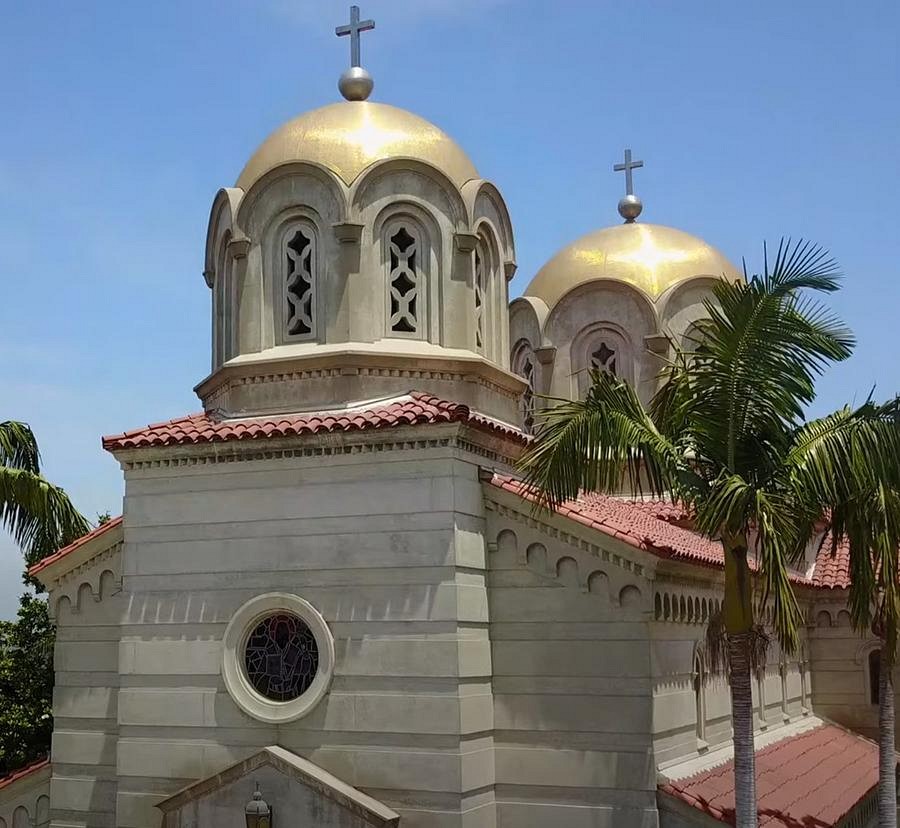
1621 West Garvey Avenue
Alhambra, CA 91803
Tue
11MarSouth Pasadena/ San Gabriel Valley Faith and Bible Study 7:00 p.m.Wed
12MarPresanctified Liturgy 7:00 p.m.Fri
14MarAkathist Hynmns Service 7:00 p.m.


